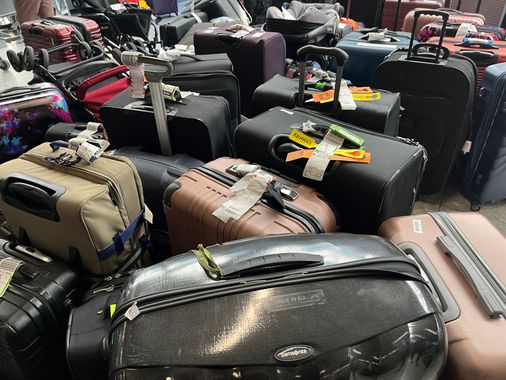LAS VEGAS — Call it the summer of travel hell, call it airmageddon, or call it something that can’t be printed in a family newspaper. Whatever your preferred term, the recent jumble of airline cancellations, staffing shortages, lost luggage, and fluctuating COVID-19 restrictions has helped buoy a profession many long perceived to be on the wane: the travel adviser.
“Suddenly, I feel like I’m in vogue again,” said Susan Bowman, a Toronto-based travel adviser. “It’s been a remarkably busy summer, and I don’t see it slowing down anytime soon. It’s been a renaissance for us.”
At last week’s Virtuoso Travel Week, an annual gathering of 5,000 luxury travel advisers in Las Vegas, the talk wasn’t about clients lost to websites such as Travelocity and Expedia. Instead, for the first time in nearly a decade, the scuttlebutt was about record demand, full schedules, and pruning client lists as the need for travel advisers balloons. It’s the biggest thing to happen in the industry since travel agents officially rebranded themselves travel advisers in 2018. Agent or adviser, the bottom line is that they’re swamped.
It’s a logical response to the current travel climate. Vacationers have grown weary of a summer spent waiting hours to speak with live airline customer representatives, battling hotels for refunds, or rebooking cruises with each new COVID-19 variant. They want someone else to do it.
“People can book trips for themselves, but, as they realized this summer, that also means dealing with all of the things that go wrong along the way,” said Teresa Ford Chope, founder of Boston-based Boost Journeys. “But if we book it, we fix it. I started my company in 2016 to help people plan beautiful itineraries, but now I’m also a travel therapist. At least once a weekend, I get a call from a client worried about a trip. So now, we’re not just designing travel for them, we’re also taking care of all the logistics. We’re focused on every detail and helping with COVID contingency plans. That’s a new role for us.”
Chope, who works in luxury travel and is part of the Virtuoso consortium of agencies, skipped last week’s Las Vegas conference because she was too busy with clients. But it’s not only the luxury market that’s swamped with new and returning clients. Elaine Osgood of Marlborough-based Atlas Travel is also seeing an influx of vacationers who have decided to leave the potential hassles to someone else. Atlas is currently hiring to keep up with the demand.
“If you book online, who do you call to try to help to get your money back? Or, who do you call to rebook the trip to another time? Those folks that weren’t working with a travel professional learned very quickly how painful and time-consuming it was to try to take care of it themselves,” Osgood said. “We have cruises that we have booked and rebooked. You lose count after a while.”
It’s an unusual and welcome change for a profession that has spent years fighting the perception that it’s as relevant as telephone operators or the CEO of Friendster. As third-party booking sites (known in the industry as online travel agents or OTAs) proliferated over the past 20 years, the number of travel agents went into decline. According to the Bureau of Labor Statistics, the number of full-time travel agents in the United States dropped from a high of 124,000 in 2000 to around 74,000 in 2014.
The bureau put the number of full-time travel agents at 70,000 in 2019 and projected the industry would lose 25 percent of its workforce by 2029.
But this summer presented challenges that even the most seasoned DIY traveler had a difficult time stomaching. Travel came back faster than anyone imagined. The result was a vacation dumpster fire.
Americans are traveling at — and in some cases, higher than — pre-pandemic levels. The US Travel Association found that vacation spending in July 2022 surpassed July 2019 numbers, despite inflation and higher airfares. Dozens of studies have found that a majority of Americans have traveled, or plan to travel, before the summer is over. One of the most recent studies, from the travel website the Vacationer, found that 80 percent of Americans said they would travel this summer.
Boston author Karen Winn, who is in her early 40s, was one of those vacationers who opted for a travel adviser when the hassles and restrictions of a trip with her extended family to Sicily were beginning to look insurmountable. A 2021 study from the American Society of Travel Advisors found that 81 percent of inquiries were from first-time clients like Winn.
“I’d never used a travel agent before,” Winn said. “But between getting hotel rooms and figuring out flight options, it was clear that I needed to use one. I was overwhelmed.”
When the Biden administration lifted COVID-19 testing requirements for foreign travel, the floodgates truly opened on European destinations. The descriptions of European airports as “hellscapes” did not deter Americans from packing their suitcases — suitcases that were likely lost in the ensuing stampede.

Inflation, political unrest, and viruses have not slowed down the thirst for travel. Nearly 70 percent of Americans said they would travel this summer “no matter what,” according to a study earlier this month from McKinsey & Company, a global consulting management company. That same study asked, “Imagine you just won $10,000 in the lottery. How would you spend this cash?” The number two answer was travel. (The top answer was savings.)
Those numbers, coupled with personnel shortages, have made for some frustrating scenarios. So frustrating that travel advisers are also finding themselves in a pinch. Clients are back, but many advisers left during the pandemic.
In Tennessee, Michelle Shrader, an adviser with InteleTravel, said that her bookings are up 300 percent over 2019. In Ohio, travel adviser Crystal Teter from Go See Travel has had more inquiries in the past six months than in the previous three years combined. Advisers are trying to keep up and also adapt to the new needs of travelers.
“Our job has changed dramatically during the pandemic,” said Beth Washington of the Washington, D.C.-based agency Getaway Guild. “So where one trip may have taken X number of hours to plan, it could take twice as long now both with questions and concerns from travelers, and also spending an hour and 45 minutes on hold with an airline or a company when there’s an issue.”
As a result, advisers — particularly those in the luxury sector — have had to be more judicious with their client lists. Most advisers make the bulk of their income from booking incentives offered by cruise ships, hotels, and tour operators rather than from their clients. But depending on the trip or the agency, planning fees are involved. The advisers we spoke with are hoping that clients will continue to see the value their expertise can make, even after the current deluge is over.
“Every time something happens — SARS, 9/11, COVID — the mindset is, well, this is going to kill the travel industry and be the end for travel advisers,” said Osgood of Atlas Travel. “But we are so resilient. Every time we come back, we come back stronger because we learn something new about the business, and we learn how to do more with less. I think the message from this summer is that, once again, we’re back.”
Christopher Muther can be reached at christopher.muther@globe.com. Follow him on Twitter @Chris_Muther and Instagram @chris_muther.





